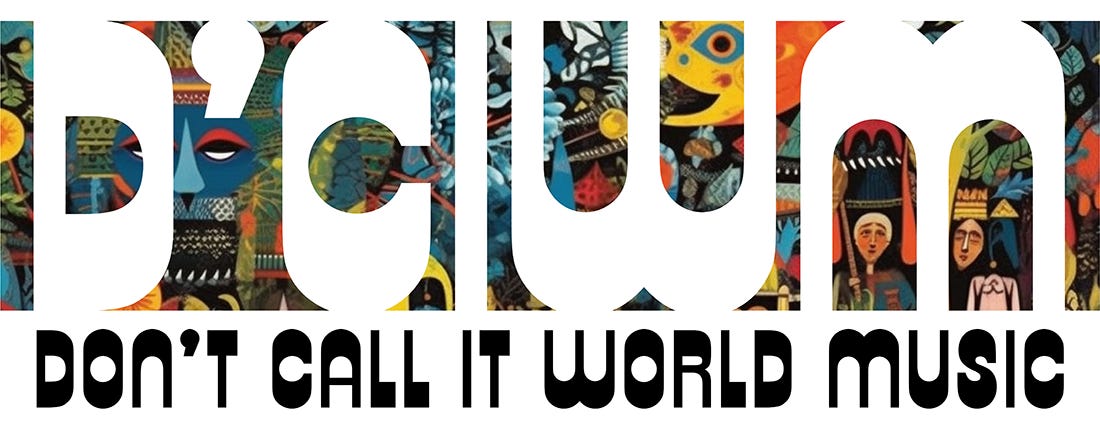Thanks to our new subscribers from last week! :)
Don’t Call It World Music is a free, independent and curated roundup of music news. Each weekly edition of our newsletter features a handpicked selection of articles related to every kind of music, offering insights into genres from every corner of the globe.
Our mission is to provide visibility to a wide array of issues, musical traditions, artists and genres that are underrepresented or overlooked in mainstream media, generate curiosity and drive traffic to original sources, particularly alternative and independent platforms.
Newlines Magazine explores the life and career of Ahmad Adawiya, an Egyptian musical legend who circumvented traditional routes to success by using cassette tapes to reach his audience directly. The article details his rise from working-class origins to fame, leading to the creation of a new musical genre, shaabi.
Shaabi?
Shaabi is an Egyptian music genre that emerged in the mid-20th century as a form of working-class street music, blending traditional Baladi roots with urban influences. Known for its catchy rhythms, use of electronic instruments, and lyrics that often mix humor, social commentary, and political undertones, Shaabi reflects the everyday struggles and aspirations of lower-class Egyptians.
DW reports on the recent clampdown on rap music in Libya by both eastern and western authorities, citing "moral values" violations as the reason. The article discusses how rap flourished during a period of political instability, providing a voice for the people. It highlights that, previously forbidden under Gadhafi, rap became a form of political expression.
In Sheeps Clothing presents an archival interview with engineer Yasuhiko Terada and insights from Haruomi Hosono from Yellow Magic Orchestra.
Not Even Past reviews a biography of Violeta Parra, a cult Chilean folk musician, emphasizing her importance as an inspiration to artists and activists. The piece underscores how Parra's work is intertwined with Chile's broader struggle for social justice and her championing of the common people.
"Under the dictatorship, people tended to hide or discard her recordings, lest they spark rumors of subversive inclinations"
CDM Create Digital Music encourages a broader view of Black contributions to music by highlighting figures from as far back as the 6th century. It focuses on St. Yared of Axum, Ethiopia, considered the first published Black composer, and discusses his contribution to early notation.
He’s technically the first published Black composer, with hymnals still used by the Orthodox Tewahedo churches for Zema chant. That’s Oriental Orthodox – the same larger grouping that includes the Armenian Orthodox, among others – but not to be confused with the Eastern Orthodox. This puts Yared in a significant role in early notation, including contributions to mensural notation in that tradition.
In any event, that music remains in Ethiopian practice today. In context, it sounds something like this :
Index on Censorship reports on the devastating impact of the Taliban's ban on music in Afghanistan, highlighting how both professional and amateur musicians are facing severe repression and risks to their lives. It details the destruction of musical instruments and the silencing of public music, replacing it with religious chanting.
This podcast from Afropop, "The Zulu Factor," explores the history and culture of the Zulu people through their music, from the early 19th century reign of King Shaka to the apartheid era and beyond. It discusses the complex role of ethnicity in South Africa, the use of radio as a tool of the apartheid state, and how Zulu musicians have navigated these challenges.. The program highlights various styles of Zulu music, including maskanda, mbaqanga, and township pop.
Maskanda?
Maskanda is a form of Zulu folk music, originally associated with migrant workers. Thought to be pioneered by Phuzushukela and often characterised by a picking guitar style which draws on a variety of historical influences, it also has an important social function with players being given sanction to publicly criticise powerful people.
DJ Mag presents a look at the unsung heroes of New York's house music history, exploring the city's vibrant scene beyond the famous DJs and producers. It profiles key figures such as Tedd Patterson, Bruce Forest, Christina Visca, and Abigail Adams, and traces house music's rise in New York from the late 1980s, highlighting the importance of venues like Better Days, Paradise Garage, and Sound Factory, and the impact of record labels like Movin' and Strictly Rhythm.
The Los Angeles Times examines the paradox of Fela Kuti's legacy in Nigeria, where his music, once a critique of the elite, is now being celebrated by them.
Stat Significant analyzes how music listening habits change with age. The study finds that younger listeners skip songs more often while older listeners tend to stick to a smaller set of channels and playlists. It suggests that younger listeners adopt a "discovery mindset" while older listeners adopt a "maintenance mindset," using streaming platforms to reinforce existing preferences.
The author reflects on the changing role of music throughout life, and the shift from music as identity formation to a practical tool for daily life.
Bibliolore explores the work of Filipino ethnomusicologist and composer Jose Maceda. The article discusses his significant fieldwork in Southeast and East Asia and his blending of Asian instruments and rhythms with European avant-garde techniques like spatialization and musique concrète.
CVLT Nation chronicles the heavy metal scene in Peru during the 1980s, emphasizing the difficult conditions that Peruvian metal bands faced, including terrorism, economic instability, and cultural conservatism.
World Music Central explores the history of military songs, focusing on British and American folk traditions. The article discusses the role of these songs in soldier's lives, from marching tunes to laments for lost comrades, highlighting the emotional range of these musical expressions.
"The British soldier’s songs, like his conversation, tended to be ribald, bawdy, cynical, except when he sang about home or about the death of a comrade, and then he was frankly sentimental"
FOND/SOUND analyzes the album Vortex Symphony (ヴォルテックス・シンフォニー) by the Japanese band Midori, highlighting their unique approach to dream pop. It points out the innovative use of samplers and electronic instruments in their music and celebrates the band's ability to incorporate a wide range of musical influences, including British, Celtic, reggae, and Asian ethnic music.
The Indian Express celebrates the legacy of Shobha Gurtu, a renowned thumri singer, exploring her contributions to the genre and the challenges she faced in gaining recognition.
Thumri?
Thumri is a light classical genre of North Indian music, known for its emotive and romantic expressions, often centered on themes of love and devotion. Originating in the 19th century, it blends classical and folk elements, features flexible ragas and talas, and is closely associated with Kathak dance and poetic storytelling
The Astana Times profiles Leora Shekufeh Eisenberg, a Harvard doctoral student researching the development of national musical traditions in Central Asia, focusing particularly on Kazakhstan.
daily.bandcamp.com introduces a curated list of the best field recordings released on Bandcamp in January 2025. Several interesting picks, including plenty of frogs in Voices of Argentinian Amphibians I :
latimes.com celebrates the 60th anniversary of John Coltrane's "A Love Supreme" and features insights from a diverse group of musicians, including Flea, Q-Tip, and St. Vincent.
ScienceDirect presents a study comparing voice disorders and training between Muslim and Christian religious officials in Turkey. The study highlights the lack of voice training for Muslim religious officials, correlating this with a higher rate of voice disorders, compared to Christian officials who receive voice and music education.
“Muslim religious officials have higher rate of voice disorder than Christian religious officials.”










